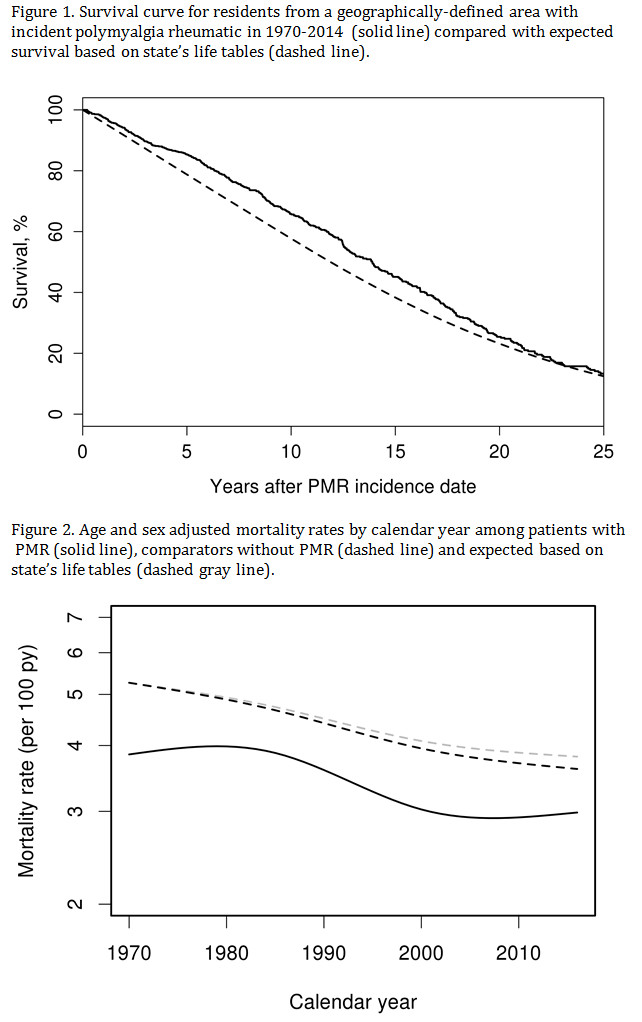Session Information
Session Type: ACR Poster Session A
Session Time: 9:00AM-11:00AM
Background/Purpose: To determine mortality risk in polymyalgia rheumatic (PMR) and compare cause-specific mortality rates among patients with PMR to age- and sex-matched comparators from the same population.
Methods: The study cohorts included all incident cases of PMR in a geographically-defined area diagnosed between 1970 and 2014 and non-PMR subjects from the same underlying population with similar age, sex and calendar year of index. Patients were followed until death, migration, last contact or December 31, 2014. Risk factors obtained by retrospective chart review among patients diagnosed in 2000-2014 included: morning stiffness, shoulder, hip and neck ache, anorexia, fatigue, weight loss, fever, erythrocyte sedimentation rate, C-reactive protein, rheumatoid factor positivity, smoking status and education. The underlying cause of death was coded from national mortality statistics and grouped according to ICD 9/10 chapters. Cox models were used for analysis.
Results: A total of 760 PMR and 760 non-PMR subjects (66% female; mean age 73.7 years for both) were followed for medians of 9.3 and 7.6 years, respectively, during which 444 PMR and 460 non-PMR subjects died. The overall standardized mortality ratio (SMR) in PMR patients was 0.81 (95% confidence interval [CI]: 0.74-0.89; Figure 1). The SMR remained consistent over the time period (Figure 2). Among patients with PMR there were fewer deaths from cancer (70 vs 88; hazard ratio [HR]: 0.67; 95% CI: 0.49-0.92), and neurological causes (16 vs 38; HR: 0.35; 95% CI: 0.20-0.63) than those without PMR. Risk factor analyses among 377 patients (with 109 deaths) diagnosed in 2000-2014 showed age (HR: 1.14 per 10 year increase; 95% CI: 1.11, 1.18) and male sex (HR: 1.82; 95% CI: 1.23, 2.71) were associated with higher mortality. No other significant risk factors were identified.
Conclusion: Survival among patients with PMR is not worse than the general population. Further research needs to be done in order to determine factors associated with improved survival in these patients.
To cite this abstract in AMA style:
Raheel S, Crowson CS, Matteson EL. Mortality Risk and Cause-Specific Mortality in Polymyalgia Rheumatica: A Population-Based Cohort Study [abstract]. Arthritis Rheumatol. 2017; 69 (suppl 10). https://acrabstracts.org/abstract/mortality-risk-and-cause-specific-mortality-in-polymyalgia-rheumatica-a-population-based-cohort-study/. Accessed .« Back to 2017 ACR/ARHP Annual Meeting
ACR Meeting Abstracts - https://acrabstracts.org/abstract/mortality-risk-and-cause-specific-mortality-in-polymyalgia-rheumatica-a-population-based-cohort-study/

